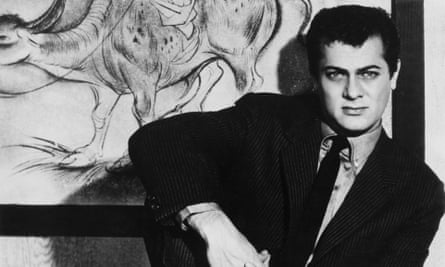Why do publicists get such terrible publicity? Some of the screen’s most disreputable characters are press agents, despite it being the profession best placed to improve its own image. In film and TV, PRs tend to be venal and corrupt at worst, damaged or ditzy at best. Robin, played by Anna Paquin in the new TV series Flack, is a classic screen publicist, a cynical schemer who can manipulate public opinion like a master, but whose private life is in freefall. Between cheating on her boyfriend and snorting coke, she spends her working hours salvaging the mangled reputations of her celebrity clients – arranging lavender marriages and teenage sex tapes without sweating too much over the moral implications. PR, she says, “makes the most of my natural talents: lying and drinking”.
Hollywood didn’t look far for its first PR villains. The dishonest studio press agent is a popular stock character in most films about movie-making – and right from the beginning their jobs were as much about covering up stars’ bad behavior as they were about posting florid biographies to fan magazines. Matt Libby, who runs damage control on Norman Maine’s drunken exploits in 1937’s A Star is Born, is introduced as “our demon press agent” with “a heart of gold, only harder”.
In fact, entertainment PRs are some of the nastiest in the movies. Fred MacMurray’s lovestruck studio press agent in 1948’s The Miracle of the Bells, who arranges a headline-grabbing memorial for his dead girlfriend, is an exception to the rule. The most famous movie publicist of all time is surely the ruthless Sidney Falco, “fully up to all the tricks of his very slimy trade”, played by Tony Curtis in 1957’s The Sweet Smell of Success – a film that Flack’s Robin must surely have seen and studied. Falco’s latter-day successor is Colin Farrell’s Stuart Shepard in 2002’s Phone Booth, the two-timing publicist cornered by a serial killer into a grisly mea culpa: “I lie to newspapers and magazines who who sell my lies to more and more people. I am just a part of a big cycle of lies. I should be fuckin’ president.”

PR professionals will tell you that’s not quite how the job works, but it’s a consistent feature of screen PR that the job is intrinsically opaque, and not a little shifty. You’re more likely to see a screen PR procuring drugs for a contact than perfecting a press release. According to a 1999 study by Karen Miller at the University of Georgia, fictional PR falls into two categories. Sometimes it is a matter of complex strategy that cannot be understood by mere law-abiding mortals, the smoke and mirrors that Robin and Falco excel at. Alternatively, it’s a breeze, a mere matter of having a drink with the right reporter or placing the right call. In 1954’s The Man in the Gray Flannel Suit, Gregory Peck confesses that he knows nothing about public relations, only to be told: “Who does? You’ve got a clean shirt and you bathe every day. That’s all there is to it.”
Both representations feed into the idea that publicity is fundamentally dishonest, and certainly not a “real” job, which means PR agents are twice as untrustworthy when they enter politics. In 1972’s The Candidate, Peter Boyle’s campaign adviser does such a good job at marketing a reluctant Robert Redford as a Democratic challenger that he creates a monster. As a TV pundit warns, the campaign is dominated by “socko salesmanship with no moral considerations involved”. It’s just a short step from there to, say, the ruthless efficiency of Ryan Gosling’s junior campaign manager in The Ides of March in 2011 and the gleeful lobbyists for tobacco, firearms and alcohol who nickname themselves the “merchants of death” in the 2005 satire Thank You For Smoking. See also Robert De Niro as the spin doctor who hires a movie producer to stage a phony war in 1997’s Wag the Dog – just to distract the nation from the president’s philandering.

The idea of political PR as crisis management fueled the TV shows Spin City and The West Wing, the latter of which presented the most right-on and morally upright team of communications professionals in screen history: a group of concerned liberals led by the unflappable press secretary CJ Cregg and the fretful communications director Toby Ziegler. Now that allegations of “fake news” fly back and forth across the White House press room, these shows seem to represent a faraway civilization.
If you’re thinking that most of those job titles aren’t strictly in the realm of PR, that’s almost the point. On screen, hype, spin, propaganda and marketing get muddled with each other and all kinds of other jobs, and a new breed of multitalented publicity professional has arisen: the fixer. Olivia Pope, played by Kerry Washington on the TV series Scandal, epitomizes the type. She and her posse of “gladiators in suits” have the capacity to make all the problems of the rich and sleazy in Washington DC go away – PR as a magic trick, but taken to extremes. See also Sandra Bullock as a political strategist shipped into Bolivia in 2015’s Our Brand is Crisis and Jodie Foster in 2006’s Inside Man, the fearsome power broker who is covering up a Manhattan banker’s Nazi past. Although she works for B-list celebrities rather than leaders of corporations and countries, Robin follows in their footsteps, finding creative, often illegal solutions to her clients’ problems – whether it’s a comedian’s transphobic standup set or a movie star’s incriminating hard drive.
Not that Robin’s friends and family know quite how low she’ll stoop, or hard she works. Her brother-in-law admits that he thought she “just flounced around drinking white wine and air-kissing”, showing that his idea of female PR agents is badly out of date. On screen at least, PR was once presented as a glamorous gig for a well-connected woman – such as Paula Prentiss, who is not shown doing any actual PR work in Man’s Favorite Sport? in 1964 or her small-screen descendants Edina in Absolutely Fabulous and Samantha Jones in Sex and the City. Robin, however, practices the dark arts of extreme PR, Olivia Pope-style.
As Miller writes, although they are often shown to be breathtakingly effective at their jobs, PRs are regularly presented as “despicable” or morally lax. Throughout their screen history, PRs are seen drinking, smoking, snorting and screwing on the job, when they are not procuring drugs or escorts for clients in the line of work. Robin’s vodka and cocaine habit recalls Jack Lemmon’s portrayal of an alcoholic PR in Days of Wine and Roses (1962), except somehow she manages to keep her job, and her dishonesty at work bleeds damagingly into her relationship with her boyfriend.
Every so often, a PR is shown doing good, as with the mental health campaign in The Man in the Gray Flannel Suit, or that way that a corporate publicist rehabilitates a struggling superhero and helps to save a city in 2008’s Hancock, but screen depictions of the job tend to disprove the idea that no publicity is bad publicity. More seriously, PR insiders regularly say the industry needs a makeover, and after the headlines made by the Bell Pottinger scandal of 2017, those calls have increased. Sounds like a job that Robin could really get her teeth into.
Flack starts on Pop TV in the US and W in the UK on 21 February
This piece was amended on 21 February 2019 to correct the name of CJ Cregg, the character in The West Wing. We originally misspelled it as CJ Gregg.

Comments (…)
Sign in or create your Guardian account to join the discussion